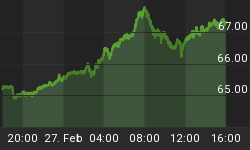Part II - Euro, Yen, Asia & Emerging Markets

With Special Guest Axel Merk
President & CIO Merk Investments,
Manager of Merk Funds
& Gordon T Long & Ty Andros
36 Minutes, 56 Slides
In Part II of this 70 minute, two part series, Axel Merk in discussions with Ty Andros and Gordon T Long, covers a broad range of the most important Global Currency issues relevant to investors.
Biggest Global Risk

Axel Merk believes the world is becoming less stable. This means investors must become more active. Gone are the days of passive 'mom & pop' investors and instead are being replaced by aggressive monetary and quant. market drivers. It is presently therefore critically important to realize that:
"The biggest risk to the world is that the current economic and monetary policies will work and we get economic growth. If this happens, bonds will plunge, interest rates will rise and governments will be unable to finance their debts!"
This realization is one of the hidden underlying drivers now impacting global currencies and driving increasing volatility.
Currency: Yen
Nowhere is the dysfunctional policy actions of politicians more evident than in Japan. The largest debtor in the world is now dramatically 'doubling down' with its "ABE-nomics"policies. As perilous as the Japanese economic policies are, with Japan having a negative current account balance position, its DEBT NOW MATTERS. Until recently, it hasn't!

Currency: Asian Tigers
The currency shock waves of instability and volatility that are washing ashore across Asia are reminiscent of the Asia Crisis of 1997-1998. Because of a combination of flexible exchange rates, strong international reserves, better monetary regimes, and a shift away from foreign-currency debt, the shock is better able to be absorbed. However, years of political paralysis and postponed structural reforms have created vulnerabilities.

Interest rate risk has now come to the forefront. Axel Merk believes bond market volatility will persist. The free ride for emerging economies is over, and those with negative current accounts will feel the pain the most.
Currency: Emerging Markets
The "Faulty Five" of India, Indonesia, Brazil, South Africa and Turkey are experiencing the worst impacts. Three of these are part of the touted investor haven of the BRICS. Capital controls loom but as was begrudgingly acknowledged at the recent Jackson Hole Monetary conference:
The choice is this: Impose capital controls OR let the Fed run your economy.

Check Out Our Extensive Library of Videos
Video Library
YouTube Channel
20-40 Minute Shows with 25-50 Supporting Slides















